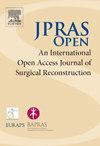Comparison of clinician- and patient-reported outcome measures in 95 abdominoplasty cases using BODY-Q and MCCRO-Q
IF 1.5
Q3 SURGERY
引用次数: 0
Abstract
Patient-reported outcome measures (PROMs) and clinician-reported outcome measures (CROMs) are not routinely compared and they could be used to assess outcomes and aid patient selection and informed consent.
Between July 2016 and February 2020, we performed a cohort study comparing PROM versus CROM scores in 95 abdominoplasty cases with all patients undergoing psychological assessment using the Royal Free Hospital and Centre for Appearance Research (RoFCAR) screening tool.
Patients and clinicians described significantly improved outcomes from an abdominoplasty procedure (p<0.001; p<0.001), and patients also derived psychological benefits with improved RoFCAR scores (p<0.001). Patients reported a significantly greater improvement between pre- and post-operative outcomes as compared to the clinicians (p=0.017). Clinicians reported worse outcomes in patients with body mass index >30 kg/m2 or patients who had >1000 g of excess fat tissue removed (p=0.005; p=0.017). Clinicians reported better outcomes in patients who achieved massive weight loss through diet and exercise as opposed to bariatric surgery (p=0.044). Patients who underwent concomitant surgical operation had significantly improved clinician-scored outcomes (p=0.047), and patients with post-operative complications achieved worse clinician-scored outcomes (p=0.036). Pre-operative and post-operative scarring, previous pregnancy, and age >50 years did not affect clinician-scored outcomes. None of the tested factors significantly affected how the patients scored these outcomes.
We demonstrated that clinicians underestimate the improvement in outcomes described by the patients and they need to be aware of their selection bias when consulting with patients preoperatively, as patients reported improvement regardless of the pre-operative or post-operative variable tested.
求助全文
约1分钟内获得全文
求助全文
来源期刊

JPRAS Open
Medicine-Surgery
CiteScore
1.60
自引率
0.00%
发文量
89
审稿时长
22 weeks
期刊介绍:
JPRAS Open is an international, open access journal dedicated to publishing case reports, short communications, and full-length articles. JPRAS Open will provide the most current source of information and references in plastic, reconstructive & aesthetic surgery. The Journal is based on the continued need to improve surgical care by providing highlights in general reconstructive surgery; cleft lip, palate and craniofacial surgery; head and neck surgery; skin cancer; breast surgery; hand surgery; lower limb trauma; burns; and aesthetic surgery. The Journal will provide authors with fast publication times.
 求助内容:
求助内容: 应助结果提醒方式:
应助结果提醒方式:


